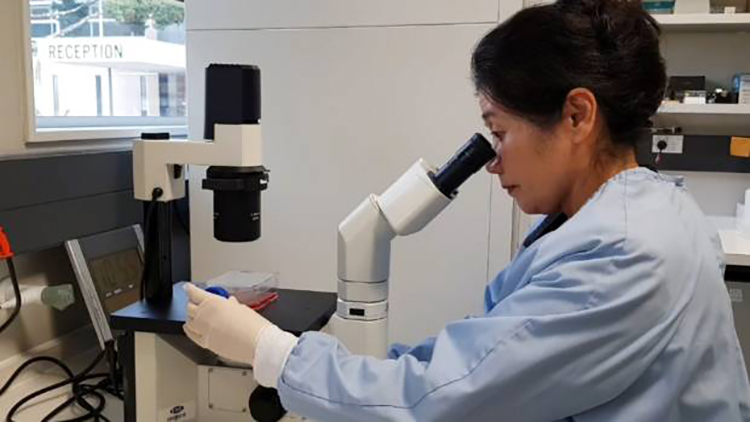
Renowned international influenza researcher, Dr Richard Webby, warns we can’t be complacent about the development of new influenza viruses that may spread from the animal world to humans.
A New Zealander, Dr Richard Webby is director of the St Jude Centre of Excellence for Influenza Research and Response (CEIRR) in Memphis, USA. Dr Webby is an expert on the interface between animals and humans in relation to influenza viruses and will be a keynote speaker at the public symposium entitled “2023 SHIVERS showcase”. The symposium is jointly organised by ESR and University of Auckland and will be held on 31 January in Wellington.
Dr Webby says that health professionals and health systems world-wide need to remain vigilant regarding the development of rogue influenza viruses which jump from animals to humans, and then more dangerously may be able to spread from human to human causing a pandemic.
“The risks have increased recently. In the past 12 months alone in US, we have seen a type of bird flu known as Eurasian H5N1 infecting more wild birds than previous variants. It finds its way into ducks, geese, gulls and terns. That means that the virus poses an elevated danger to mammals that prey on those birds, including wild red foxes, skunks, bears, and racoons. A confirmed human infection from this new influenza virus has also been reported” he says.
“However recent research suggests that these viruses have not yet developed the ability to transmit between humans, but it is still possible.”
“What it’s going to take for this virus to transition from being a duck or a chicken virus to being a mammalian virus is more chances to replicate in those mammalian hosts,” Dr Webby says. “So that’s why when we see these mammals being infected by this virus, we do need to take notice because the increased impact of this virus is of concern.”
Dr Webby’s public lecture “renewed importance of preparedness” will highlight the risks to human health of emerging influenza viruses and strategy to be better prepared. It will be a chance to hear the most authoritative and up-to-date developments and research into influenza control and pandemic planning from an international expert.
Dr Webby is visiting New Zealand to meet with the SHIVERS (Southern Hemisphere Influenza and Vaccine Effectiveness Research and Surveillance) project researchers to celebrate the 11th anniversary of SHIVERS. His public lecture is part of the symposium called “The 2023 SHIVERS showcase”. It will see a range of authoritative speakers address public health professionals and others from the public sector. Visit the WellKiwis website for the public lecture series topics.
The public symposium is between 4 and 6 pm on Tuesday, January 31 at Victoria University of Wellington (Pipitea Campus, 33 Bunny Street I Rutherford House, Room RHLT2, Wellington). For those interested to attend, please register here.
The New Zealand flu experts involved in the SHIVERS study will also brief their international colleagues from the US National Institutes of Health, St Jude Children’s Research Hospital in Memphis, Los Angeles Children Hospital, University of Michigan, and US-Flulab about the study over four days in Wellington.
Dr Sue Huang, the principal investigator (PI) of SHIVERS-I, II, III, IV, and Dr Nikki Turner, PI of SHIVERS-V, say this shows international confidence in the New Zealand health system and the results produced through a strong collaboration among scientists, researchers, clinicians, hospitals, sentinel general practices.
Background
- 2023 marks the 11th anniversary of the Southern Hemisphere Influenza and Vaccine Effectiveness Research and Surveillance (SHIVERS) program. Led by the Institute of Environmental Science and Research (ESR), SHIVERS is an award-winning, multi-centre and multi-disciplinary national and international collaboration focussing on influenza.
- SHIVERS-I (the first iteration) was funded by the United States Centers of Disease Control and Prevention (US-CDC) during 2012-2017. It established modern surveillance methods which became essential national infrastructure and established emergency response capability. SHIVERS-I informed public health policy changes nationally and internationally. It generated over 30 peer-reviewed publications including Lancet, PLoS Medicine, Nature Communications, and Journal of Infectious Diseases.
- SHIVERS-II, III, IV (WellKiwis adult, infant and household respectively) are longitudinal prospective community and household cohort studies through funds from the US-National Institute of Allergy and Infectious Diseases during 2018-2028. These studies aim to increase understanding of influenza virus burden and transmission and how an adult’s prior, or a child’s first exposure to the influenza virus, shapes their immunity to future virus exposures. The goal is to inform development of longer lasting and more broadly protective universal influenza vaccines and other countermeasures.
- SHIVERS-V, led by University of Auckland through funding from Flulab, leveraged the existing SHIVERS platforms with additional new platforms to understand the fast changing and striking patterns of influenza and other respiratory viral infections in a post-COVID-19 world in a rare New Zealand Island setting with unique New Zealand’s COVID-19 related non-pharmaceutical interventions.
- Most recently, SHIVERS-II, III and IV platforms have been expanded to respond to the COVID-19 pandemic by investigating COVID-19 disease burden, transmission, risk factors and vaccine effectiveness with additional funding support from Te Whatu Ora – Health New Zealand.